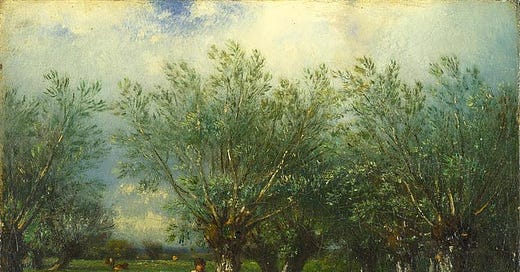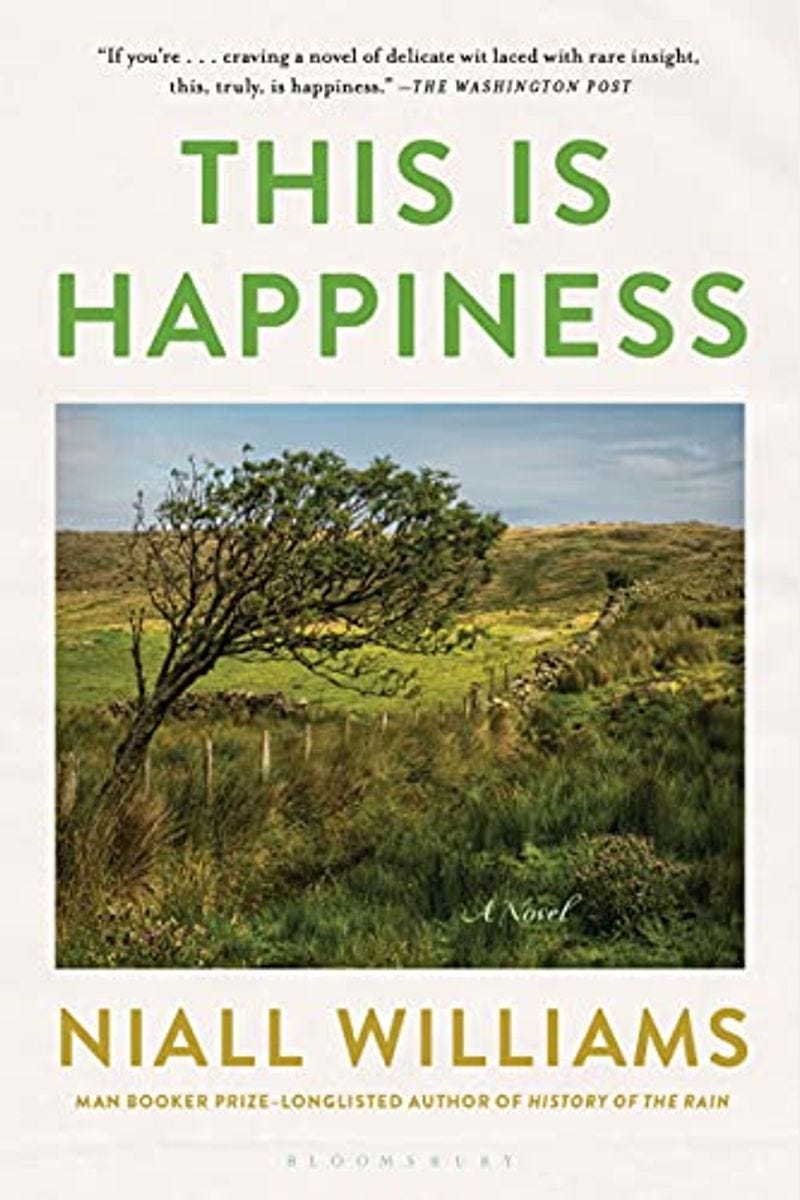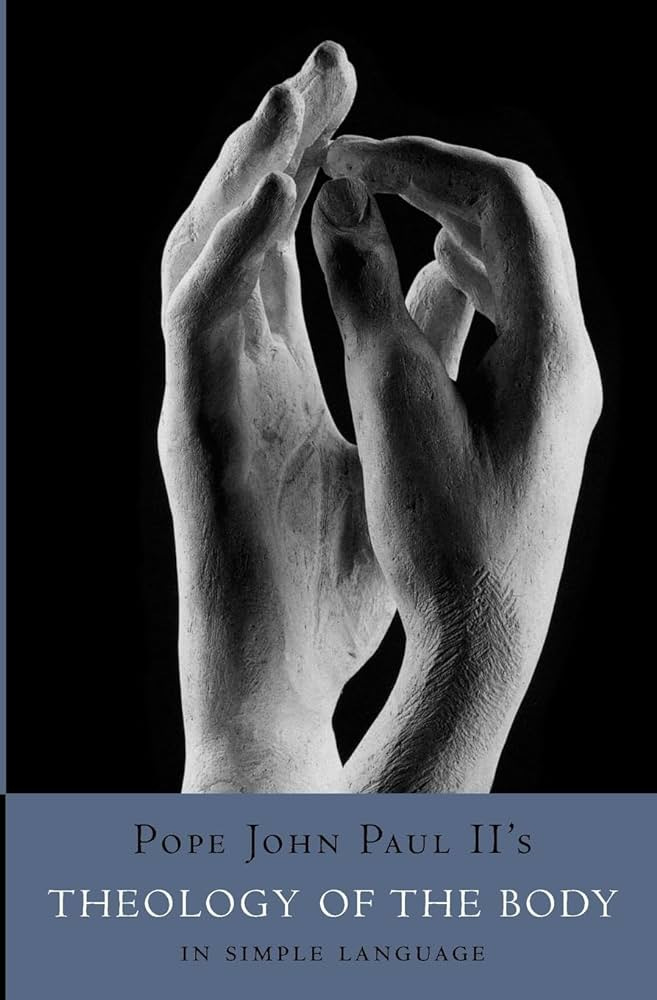Week 6 (2025)
cremation & nature's claims, human hacking, designer babies & AI embryo selection, seeing others, hospitality & stained glass lives
Click title to open in browser. You can reply directly to this email if received in your inbox.
to read: books
This Is Happiness — Niall Williams — Was prompted to pick this up again after Paul Kingsnorth recently mentioned reading it. Take a gander at these lines that will stun your little heart.
Theology Of The Body In Simple Language — Pope John Paul II — “The body reveals the person.” No funny business or goofy conversational explanations. Just an accessible, succinct version of the original text for us common folk.
to read: essays, articles, newsletters
- , Mere Orthodoxy (not paywalled, you might just need a free login) — “At present, our secular culture is suffering the consequences of a “blank-slate” theory of identity, characterized by an almost absurd forgetfulness of the body and of the body’s stubborn continuity amidst the morass of ever-new technologies which presume to render it obsolete. Likewise, and more to the point, our churches are suffering a similar fate in the way we think about and relate to God. This I have called a “blank-slate theology.” …How does new creation work? This is where our two theological frameworks come to fundamentally different conclusions.”
(related: Earthen Vessels (book) and Why We Need Graveyards, shared previously)
Nature's Claims — Matthew Lee Anderson, The Path Before Us (paywalled but worth it, for the comments on this one as well) — “…the more fundamental criticism might be that [artificial reproductive technologies] participate in an ethic of medicine in which first, do no harm has no hold or bearing on us—in which nature is mute, incapable of making demands upon us or seizing our attention.”
- and , The New Atlantis — “Human beings have a nature: distinctive forms and pathways of flourishing that cannot easily be bypassed without causing harm.”
(related: ’s novel Exogenesis)
A Future For The Family: A New Technology Agenda For The Right — First Things — “As scholars, writers, and policy experts, we believe that public policy should direct technology toward the flourishing of the family and the human person.”
*Meandering thoughts incoming*
I’m aware everyone and their mother in certain circles has already read and/or shared this. But it’s a succinct overview of what human flourishing could like—the essay above it giving a more thorough, harrowing look of how many tentacles technique is actually reaching into when it comes to the most delicate, sacred, and ontological of human concerns.
I sympathize with Matthew when he says, “It’s generally sound work, though I honestly cannot figure out what in the Year of Our Lord 2025 one more statement is supposed to do” …skeptical of meaningful impact “without a significant infrastructure to make them actionable.” Hearty Touché. And yet I also keep creating my—as I’ve called it in certain moments “stupid little” newsletter—because action and right living often start with an awareness and articulation of what to aim towards. There are countless folks using their varying degrees & kinds of influence and expertise to focus thought and action toward specific areas on that list. And exponentially more doing steady, hidden work in those realms—or simply living in ways which imperfectly embody them—that we may never know about.
Perhaps we do overestimate what a statement, policy, or public-facing actions can accomplish, while on the flipside underestimating the ripple effects of average lives lived in limited and less-than-ideal circumstances, yet aimed toward the good regardless. Both approaches and types of influence matter. None of it is wasted. “You can’t expect yourself to be in the same place as them, when God never gave you what He gave them… But what did God give you? You be faithful where you are.”
So circling back, points two and three are the reason I created this and this. Indeed, “A culture hospitable toward children will take greater care of the very bodies that are their first home and source of life.”
*Here begins my imaginary response to the crafters and signers, et. al*
On point two, I will say that we should be preserving a woman’s bodily well-being from “hacking” regardless of whether or not she is bearing children, or ever will. The female body continues to be routinely hacked out of healthy hormonal functioning before procreation is even part of the picture. Reproductive health is connected to overall health. Default medical models do not foster this approach, as we see in the way the majority of medical professionals are trained more thoroughly to cover up symptoms, to override and suppress the female reproductive system (at younger and younger ages) without appropriate thought to interconnected harms, explanation of risks, or offering of alternatives. In lieu of knowledgeable care ordered toward swift diagnoses and restoration of whole, healthy functioning, we’ve received our current Cyborg Machine Era of flattened women’s health. But there is a better way. If only medical schools would catch up to those doing the work of dignifying women’s intricate bodies with real healing, instead of the strange emphasis on wrestling them into forced submission. But I digress. (*To be fair, the related Stop Hacking Humans essay does touch on this a bit.)
For the compilation:
Artificial Intelligence ‘Beginning To Make Decisions About Who Is Brought Into The World’ — Wendy Tuohy, The Sydney Morning Herald — “A lot of patients do feel a bit disconnected when they go through IVF and there was fear among some around making something that is difficult feel more difficult by reducing human contact.”
Designer Babies Are Teenagers Now—And Some of Them Need Therapy Because Of It — Emi Nietfeld, Wired — “They tend to get what they want and don’t hear “no” a lot. So when their kid shows up and isn’t the way that they want, what happens? Usually, it’s a disaster… It's common in these families to have different egg donors for different kids because they’ve tried to get, say, a sporty son and an artsy daughter. What do you do when one of your children has found their half-siblings and is bonding, while your other child doesn’t have a good experience with their newfound relatives? Who do you invite to Thanksgiving?”
It Is Good To Be Here — Anonymous, Dappled Things — “Not long after, I met my biological father. Ideologically, we had nothing in common. I was the first Christian that he ever knew… Whenever I mentioned him, my nature father, to my parents, they were not interested. They would look away and the conversation would end.”
(related: ’s Sperm & Egg Donation: What Could It Hurt?, ’s Our Bodies, Our Anger and Three Christmas Dinners, shared previously)
- , The Gentle Nudge — To bring it back to basics.
That I Might Be Seen — John Cuddeback, LifeCraft — “How I see the persons around me is more in my power than how they see me. Maybe, when I feel unseen it is then most important that I look outward at others, that I renew my effort to see them better.”
Good Things In This Country: Seven Suggestions For Simple Hospitality — Sarah Reardon, Hearth & Field — “Sam warmed Frodo’s stomach and heart with wild rabbits and foraged herbs, but most of all with his humble generosity. What good, simple things are running wild about us that we might share with others?”
(more of her writing I’ve appreciated and shared previously here, here, and here)
- — “We sing together about
touching clouds. Is this not poetry?
Is this not worth something,perhaps, everything?”
The Stained Glass Of Our Lives —
, Ekstasis — “He sacrificed everything to bring us into his presence, and now, he wants to hear us speak… Wake and see the beauty that God has wrought through the story of your life. Then, when you have taken your fill of faith and joy, go out and share it with those who have yet to see the warm sunlight streaming through the stained glass.”
to watch, listen to
Continuing On:
Black & Red All Over: A Classic Confessing Anglican Podcast with Steven Wedgeworth & Richard Tarsitano — The Kigali Commitment & The Unique Sinlessness Of Christ — Articles 15-16 (Of Christ Alone Without Sin, Of Sin After Baptism) — Coming down hard on Catholic confession! Ironic, with the book I completed last week to help understand it.
The Natural Womanhood Podcast with
& Cassondra Moriarty — Season 2, Episode 9 — Can Catholics Use NFP? with — She overflows with generous wisdom. Lots of food for thought, plus she’s simply fun to listen to.Woven Well Podcast with
— Episodes 37-38 — Infertility 101 and Prayer Guide For The Female Body
(more resources on female embodiment in the Big Ol' Compilation)
to glean from: tip, product, resource
Look & See: A Portrait Of Wendell Berry (Original Motion Picture Score) — I don’t remember the film much as it’s been a few years. But my husband and I purchased the associated artwork (printed on a set of cards) soon after seeing it. We have them hanging in our living room. If I study those pictures while listening to this soul-searing music, my heart might break from too many breathtaking and bittersweet things all at once.
















Haley, Life Considered is fast becoming one of the two emails I most look forward to receiving Monday morning (even though I very rarely get through all the articles). Thanks for gathering these! Particularly the pieces on in vitro fertilization. I've been amazed how normalized IVF has become as THE solution to infertility challenges, with so many women who deal with infertility not even realizing there is a vast range of care and support that should be happening before IVF even ends up as part of the discussion. And I should clarify, I think fertility and conception support is a very nuanced conversation and cannot be painted with a broad brush. But the fact that we've moved into an era where so many children have been conceived outside of the human body and in exchange for money should be alarming to even those who find no ethical complications with IVF. There is a cost—much higher than I think any of us comprehend—to making life a purchasable product.
Yes, Yes, Yes!
"action and right living often start with an awareness and articulation of what to aim towards. There are countless folks using their varying degrees & kinds of influence and expertise to focus thought and action toward specific areas on that list. And exponentially more doing steady, hidden work in those realms—or simply living in ways which imperfectly embody them—that we may never know about.
Perhaps we do overestimate what a statement, policy, or public-facing actions can accomplish, while on the flipside underestimating the ripple effects of average lives lived in limited and less-than-ideal circumstances, yet aimed toward the good regardless. Both approaches and types of influence matter. None of it is wasted. “You can’t expect yourself to be in the same place as them, when God never gave you what He gave them… But what did God give you? You be faithful where you are.”"
This is such an important point! We shape the culture, whether we're policy makers or cake bakers. Discerning where God calls us now, and being faithful to it, is the most important thing. Thanks for saying this, and continuing on with your steady work.